|
|
Building a Community of Scientists Students
in the Chemistry Department at Stony Brook are immersed in an
intellectual community from the start of their research work, when they
first join a research lab. In addition, students are assigned a thesis
committee from the end of their first year. Beyond these specific
support structures, the department has the potential to provide a wider
community through social and professional events, shared governance,
and shared resources.
|
|
|
Program Context - The Department
Our Ph.D. program has
~130 doctoral students, and grants 15-20 Ph.D's a year.
We do not have a
separate master's program, but we graduate approximately 15 master's
students a year.
Median time to degree
for the Ph.D. is 5 to 5 1/2
years.
Students come from a dozen different countries, with roughly 1/3 domestic and 1/3 from China.
|
|
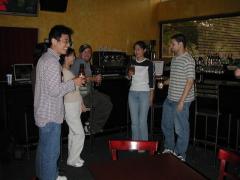
Celebrating a successful Ph.D. defense at the University Café
|
Research Groups All
Ph.D. students in our department are members of research laboratories,
or "groups". Group sizes at Stony Brook vary from less than 4 to more
than 15 graduate students, with one faculty advisor. Groups often also
include postdoctoral and undergraduate researchers. The research group provides the primary intellectual community for each graduate student.
Most labs have weekly Group Meetings, where students gain much of their
in-depth scientific knowledge and professional skills such as public
speaking. In addition, research groups often organize their own social
events. The strength of the sense of community within individual
research groups varies, depending on the advisor and the makeup of the
group.
|
|
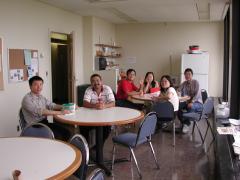
Students eating lunch in the grad lounge
|
Shared Departmental Resources The
department aids the development of intellectual community by providing
shared resources, and training in how to use them. Such resources
include: Scientific equipmentLibrary and electronic literature-searching toolsComputersOffice spaceGraduate lounge
|
|
|
|
Goals for the Community Developing a sense of community in the
department is important to maintain satisfaction among
students, postdocs, and faculty, and to encourage collaborations.
A strong intellectual community will attract
prospective students, improve research productivity, and increase the
breadth of our students' professional and research skills.
|
|
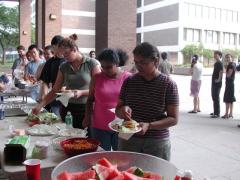
Summer department barbeque
|
Advancement-to-Candidacy Committee (ACC) Students
in the Chemistry Department at Stony Brook are assigned their thesis
committees (ACCs) relatively early, at the end of their first year.
Each ACC includes the student's advisor, as well as two other faculty
members, one of whom serves as Chair. In
response to student feedback in our Graduate Program Assessment, the
policies and requirements for the ACC have been changed to increase the
intellectual involvement of the ACC in each student's graduate career: Both the Chair and 3rd member are chosen for their expertise in areas related to the student's research.Students
will meet with their ACCs once each year to discuss their research.
Previously, students held only two meetings with their ACC, including
the thesis defense, that focused on the student's research.
|
|
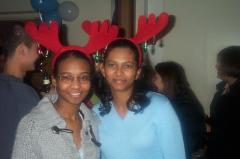
Winter holiday party
|
Departmental Social and Professional Events In
addition to the individual communities of research groups and ACC's,
the department offers a broader intellectual community to our students.
Examples of departmental community-building events include:
First-year student orientation activities, such as pairing with a peer mentorColloquia and seminars*Chemistry Research DayUniversity Café (a gathering spot after many seminars)Sponsored social events, such as summer barbeques and winter holiday party*As
a result of the Graduate Program Assessment, we instituted a program of
brown-bag lunches for interested students to meet with visiting seminar
speakers.
Chemistry Research Day
A Snapshot describing the annual department-wide celebration of
chemistry research at Stony Brook. The event includes lunch, a poster
session, and a public lecture.
|
|
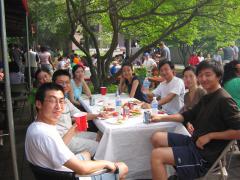
Students enjoy the GSO/GCS barbeque.
|
Graduate Chemical Society Students
in the chemistry department have recently created a social and
pre-professional organization, the Graduate Chemical Society, whose
purpose is to bring together graduate students, faculty, and staff from
chemistry-related departments at Stony Brook. The GCS is an official
university club, receiving funding from the Graduate Student
Organization (GSO), that strives to improve integration and
communication within the SBU chemical research community. A further
goal is to publicize the chemistry research achievements of Stony Brook
graduate students within the local and campus communities. The GCS
provides support to major chemistry department events and activities,
including the annual GSO/GCS Summer Barbeque, the chemistry holiday
party, and Chemistry Research Day.
|
|
|
|
Assessing Our Community A
year and a half ago, our CID team organized a full assessment of our
graduate program, from the point of view of the students. This
assessment addressed several aspects of developing a strong
intellectual community in our department. Among the findings: Students want more opportunities to discuss their research with their thesis committee.Events such as Chemistry Research Day provide important opportunities for social and professional interactions.Students value a robust seminar program, and want to have opportunities to meet with visiting speakers.Students
take their cue on whether they should attend a departmental social or
professional event from whether their advisor is attending.
Graduate Program Assessment
A Snapshot of our Graduate Assessment
|
|
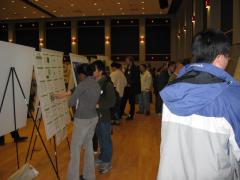
Chemistry Research Day
|
Shared Governance Developing
a robust intellectual community requires the treatment of all members
as professional colleagues, each with a role in governance. The
Graduate Program Assessment provided students with an opportunity to
have a direct impact on our program. To continue this process, we
reinstated a past practice, including two student members on the
department's Graduate Affairs Committee. In addition to this mechanism
for ongoing representation, we are now planning the first update to our
Graduate Program Assessment.
|
|
|
Unanswered Questions While
we have made significant progress in building a sense of community in
our department, there is still a significant disparity in the
engagement of various populations of students and faculty. Several
questions remain: How do we increase the involvement of all students, especially foreign students, in the departmental community? How do we foster an appreciation for the benefits of community among students from different cultures? How do we institutionalize community-building activities and procedures?
|
|
|